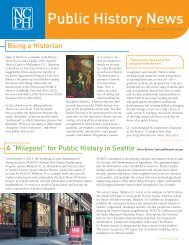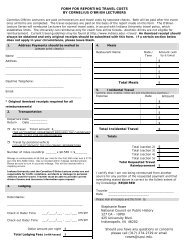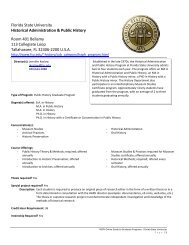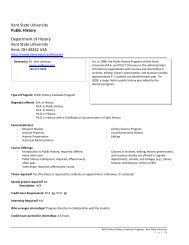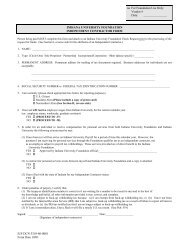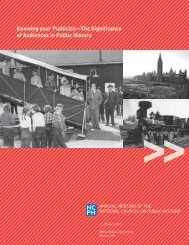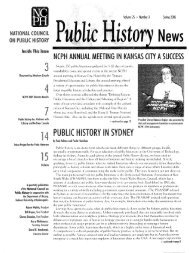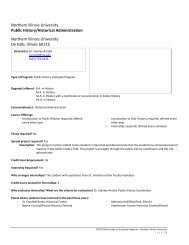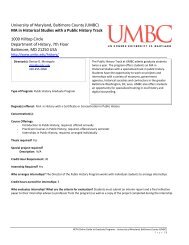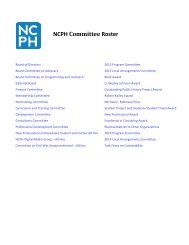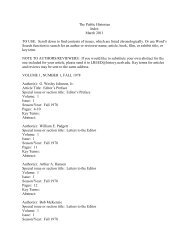Case Statement - National Council on Public History
Case Statement - National Council on Public History
Case Statement - National Council on Public History
You also want an ePaper? Increase the reach of your titles
YUMPU automatically turns print PDFs into web optimized ePapers that Google loves.
Aar<strong>on</strong> Shapiro<br />
Assistant Professor<br />
Auburn University<br />
I am an assistant professor of history at Auburn University, where I direct our public<br />
history program. I previously served as nati<strong>on</strong>al historian for the US Forest Service,<br />
where I was involved with a variety of public history projects, including film and oral<br />
history. One such effort, the U.S. Forest Products Lab Centennial Oral <strong>History</strong> Project,<br />
focused <strong>on</strong> training students to collect oral histories and make them available digitally.<br />
As a teacher, I push my students to think bey<strong>on</strong>d collecting, emphasizing the<br />
collaborative nature of digital history, the potential to ask different questi<strong>on</strong>s of the<br />
digital archive, and the possibilities of presenting historical analysis in multiple formats,<br />
all while focusing <strong>on</strong> key aspects of project management with multiple collaborators.<br />
Having recently taught my department’s first graduate seminar in Digital <strong>History</strong> and<br />
New Media, I hope to explore digital history’s place in the curriculum with working<br />
group participants. The seminar focused <strong>on</strong> theories of new media and using new media<br />
in historical scholarship and public engagement. Students examined new media in<br />
historical practice and were resp<strong>on</strong>sible for evaluating a variety of existing digital tools<br />
and projects in written and oral presentati<strong>on</strong>s. I encouraged students to use our Omeka<br />
platform if they were not comfortable with web design, since we would not cover the<br />
latter in seminar. Each student completed their own digital history project and in small<br />
groups, they developed tools and projects for use in a statewide public history symposium<br />
we hosted later in the year. One student presented her work at the symposium <strong>on</strong> a panel<br />
devoted to using digital history and new media to cultivate community. Library support<br />
has been crucial for carrying out digital projects in several of my classes but building<br />
campus-wide support for a digital humanities center have proven more difficult. I would<br />
be interested in hearing from colleagues how their digital history teaching c<strong>on</strong>nects with<br />
other digital humanities efforts <strong>on</strong> their campuses.<br />
I am struck by the need not <strong>on</strong>ly to include digital history in public history courses but<br />
also am focused <strong>on</strong> integrating it into all graduate history courses. The challenge, as I see<br />
it, is to effectively train current students in digital history theory and methods so that they<br />
can ask different research questi<strong>on</strong>s that open up new lines of historical inquiry and<br />
present historical informati<strong>on</strong> in new ways. That being said, I remain c<strong>on</strong>cerned that if<br />
digital history is offered as a stand-al<strong>on</strong>e course within the curriculum—whether required<br />
or opti<strong>on</strong>al—that it sends a message that the field is somehow separate from the broader<br />
historical discipline. In this sense, it becomes something that supplements what our<br />
students see as their main field of study, rather than integrated into their research and<br />
writing. To avoid putting digital history in a silo, I have engaged colleagues about how<br />
best to integrate digital history theory and methods into their courses. I’ve d<strong>on</strong>e the same<br />
with our public history curriculum—so our standard graduate seminar in early American<br />
history, for example, includes a public history project comp<strong>on</strong>ent as well as a traditi<strong>on</strong>al<br />
research and/or historiographical essay. In all this, I recognize a need for current faculty<br />
to have opportunities to learn more about digital history so that they can feel comfortable<br />
integrating it into their teaching.



